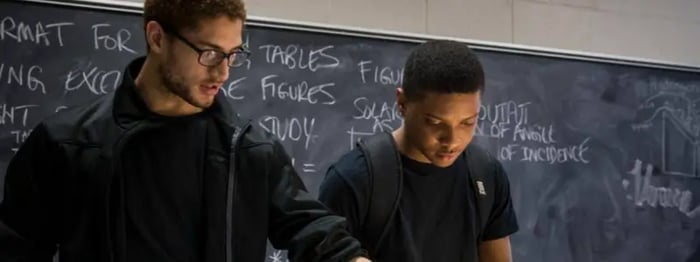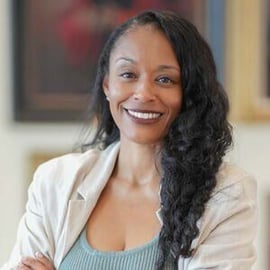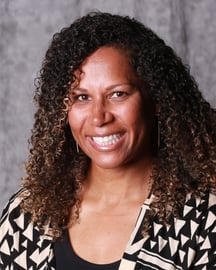- About
- Academics
- Admissions & Aid
- Life
- Research
- News & Events

Home
> Academics
> Majors
> Journalism in sports, culture, and social justice
Journalism in Sports, Culture, and Social justice
Founded in collaboration with Spike Lee ’79, the Journalism in Sports, Culture, and Social Justice Program empowers students to use all platforms to deliver a clear and compelling story.
The Program at a glance
Your search for truth can uplift all of humanity.
Department
Learn More
The program focuses on innovative storytelling using visual journalism, audience development, arts and entertainment, and data applicable to sports, arts and entertainment, and social justice.
Earn the Major
Learn more
Every journalism major must complete nine courses with a C or better, plus a pass/fail journalism or sports-related internship. There are six mandatory core courses.
Earn the Minor
Learn More
Every Morehouse student can benefit from the journalism minor, regardless of his major. The minor provides a broad foundation in multimedia journalism.
Illuminated by Morehouse:
Olympic legends Edwin Moses ’78 and John Carlos (who shook the world by raising a fist on the victory podium) discuss their history making influence as well as Simone Biles, Sha’Carri Richardson, Simone Manuel, and the state of sports today, including athletic advocacy and rights, mental health, and diversity. Hosted by associate professor Ron Thomas, director of the new Journalism in Sports, Culture, & Social Justice major. Welcome to Illuminated by Morehouse Ep2 : The Olympics: A Look Back & The Path Forward.
About Journalism, Sports, Culture, and Social Justice
-
Overview
Overview
FOCUS ON INNOVATIVE STORYTELLING USING VISUAL JOURNALISM, AUDIENCE DEVELOPMENT, ARTS AND ENTERTAINMENT, AND DATA APPLICABLE TO SPORTS, ARTS AND ENTERTAINMENT, AND SOCIAL JUSTICE.
Dr. Martin Luther King Jr. ’48 once said, “education must enable one to sift and weigh evidence, to discern the true from the false, the real from the unreal, and the facts from the fiction.”
While defining the importance of education, Dr. King also could have been writing journalism’s mission statement. Those principles have not changed. However, in the 15 years of Morehouse’s journalism program, the discipline has become a rapidly evolving multimedia environment that has chopped down the past’s print, broadcast, and photographic silos.
Founded by famed filmmaker Spike Lee ’79 and the late ESPN sports columnist Ralph Wiley, the Journalism in Sports, Culture, and Social Justice addresses the needs of student journalists who are mastering media and technological literacy using creativity and innovation.
-
Outcomes

OUTCOMES
The following are the learning outcomes of the journalism program:
- Writing will become clearer, more concise, and better organized
- Critical thinking, interviewing, and news analysis skills will improve
- Skilled usage of photography, video, and audio as storytelling tools
- Real-world exposure to professional journalists through internships, conferences, and covering events
- Comfort in using social media as reporting tools and contact platforms
- Awareness of historic and contemporary racial dimensions of sports
Career Options
As a minor, the journalism program produced more than 90 students working in media, sports, or related industries. They have taken jobs with newspapers, websites, magazines, television stations, advertising firms, corporate marketing and public relations, and sports journalists and media relations professionals.
More than 40 of our students have obtained master’s degrees in journalism. Others used their journalism background as a springboard to law school and graduate study in psychology, sports management, fine arts, film study, political science, theology, and other fields.
Historic Impact
Journalism’s positive contributions to Black people date back to at least 1827 when Freedom’s Journal was printed as the first Black-owned and operated newspaper in the United States. Journalism’s influence took on new heights during the post-World War II civil rights movement.
“If it hadn’t been for the media – the print media and television – the civil rights movement would have been like a bird without wings, a choir without a song,” civil rights icon Congressman John Lewis said in the closing words of the Pulitzer Prize-winning journalism classic “The Race Beat” by Gene Roberts and Hank Klibanoff.
-
Earn the Major
Bachelor of Arts in Journalism in Sports, Culture, and Social Justice
CURRICULUM
General Education (Core)
33-48 hoursRefer to the general education requirements for more information.
Journalism Major
30 hoursEvery journalism major must complete nine courses with a C or better, plus a pass/fail journalism or sports-related internship. There are six mandatory core courses:
- HJOU 258— Intro to Multimedia Journalism
- HJOU 368— Advanced News Writing
- HJOU 388— Multimedia and Visual Storytelling
- HJOU 410— Internship
- HCOM 457— Mass Media Law
- HJOU 490— Journalism Innovation
To complete the curriculum, each major must take four courses in one of these tracks:
- Sports Journalism (HJOU 378— Sports Reporting is required plus three electives)
- Arts and Culture (HJOU 380— Movies, Music and Celebrity Journalism is required plus three electives)
- Social Justice Journalism (HJOU 350— Social Justice Journalism plus three electives)
Among the electives, these three apply to all tracks: HJOU 389—Drone Storytelling; HJOU 488—Advanced Multimedia and Visual Storytelling; PHI 202 or 302— Critical Thinking or Philosophical Ethics.
-
Earn the Minor
Minor in Journalism in Sports, Culture, and Social Justice
CURRICULUM
Every Morehouse student can benefit from the journalism minor, regardless of his major. The minor provides a broad foundation in multimedia journalism. Even if a student doesn’t want to become a journalist, his writing will become clearer, more concise, and better organized. Those are valuable assets in the professional world, whether writing a legal brief, an enlightening sermon, a compelling marketing brochure, a dramatic ending to an NBA Finals game, or a critical grant proposal for STEM research.
Outcomes
Through our courses, the student will benefit in the following ways:
- Learn to write with fewer words that make a bigger impact on readers
- Critical thinking, grammar, and punctuation skills will improve
- Introduction to multimedia platforms and technology
- Improved communications skills applicable to any profession
The five core courses focus on reporting, interviewing, journalism ethics, online writing, and social media, and using photography and videography as storytelling tools.
CORE REQUIREMENTS
15 HOURSEvery journalism minor must complete five courses with a C or better, plus a pass/fail journalism or sports-related internship. There are five mandatory core courses:
- HJOU 258— Intro to Multimedia Journalism
- HJOU 368— Advanced News Writing
- HJOU 388— Multimedia and Visual Storytelling
- HJOU 410— Internship
- PHI 202 or 302— Critical Thinking or Philosophical Ethics
APPROVED ELECTIVES
THREE HOURSChoose one course from the list below:
- HJOU 378— Sports Reporting
- HJOU 478— The Power of Black Activist Athletes
- HCTM 258— Survey African American Cinema
- PSY 340— Black Men, Black Boys, and Psychology of Modern Media
- HCOM 457— Mass Media Law
- KSP 464— Special Topics in Kinesiology: Sports Analytics
Overview
FOCUS ON INNOVATIVE STORYTELLING USING VISUAL JOURNALISM, AUDIENCE DEVELOPMENT, ARTS AND ENTERTAINMENT, AND DATA APPLICABLE TO SPORTS, ARTS AND ENTERTAINMENT, AND SOCIAL JUSTICE.
Dr. Martin Luther King Jr. ’48 once said, “education must enable one to sift and weigh evidence, to discern the true from the false, the real from the unreal, and the facts from the fiction.”
While defining the importance of education, Dr. King also could have been writing journalism’s mission statement. Those principles have not changed. However, in the 15 years of Morehouse’s journalism program, the discipline has become a rapidly evolving multimedia environment that has chopped down the past’s print, broadcast, and photographic silos.
Founded by famed filmmaker Spike Lee ’79 and the late ESPN sports columnist Ralph Wiley, the Journalism in Sports, Culture, and Social Justice addresses the needs of student journalists who are mastering media and technological literacy using creativity and innovation.

OUTCOMES
The following are the learning outcomes of the journalism program:
- Writing will become clearer, more concise, and better organized
- Critical thinking, interviewing, and news analysis skills will improve
- Skilled usage of photography, video, and audio as storytelling tools
- Real-world exposure to professional journalists through internships, conferences, and covering events
- Comfort in using social media as reporting tools and contact platforms
- Awareness of historic and contemporary racial dimensions of sports
Career Options
As a minor, the journalism program produced more than 90 students working in media, sports, or related industries. They have taken jobs with newspapers, websites, magazines, television stations, advertising firms, corporate marketing and public relations, and sports journalists and media relations professionals.
More than 40 of our students have obtained master’s degrees in journalism. Others used their journalism background as a springboard to law school and graduate study in psychology, sports management, fine arts, film study, political science, theology, and other fields.
Historic Impact
Journalism’s positive contributions to Black people date back to at least 1827 when Freedom’s Journal was printed as the first Black-owned and operated newspaper in the United States. Journalism’s influence took on new heights during the post-World War II civil rights movement.
“If it hadn’t been for the media – the print media and television – the civil rights movement would have been like a bird without wings, a choir without a song,” civil rights icon Congressman John Lewis said in the closing words of the Pulitzer Prize-winning journalism classic “The Race Beat” by Gene Roberts and Hank Klibanoff.
Bachelor of Arts in Journalism in Sports, Culture, and Social Justice
CURRICULUM
General Education (Core)
33-48 hours
Refer to the general education requirements for more information.
Journalism Major
30 hours
Every journalism major must complete nine courses with a C or better, plus a pass/fail journalism or sports-related internship. There are six mandatory core courses:
- HJOU 258— Intro to Multimedia Journalism
- HJOU 368— Advanced News Writing
- HJOU 388— Multimedia and Visual Storytelling
- HJOU 410— Internship
- HCOM 457— Mass Media Law
- HJOU 490— Journalism Innovation
To complete the curriculum, each major must take four courses in one of these tracks:
- Sports Journalism (HJOU 378— Sports Reporting is required plus three electives)
- Arts and Culture (HJOU 380— Movies, Music and Celebrity Journalism is required plus three electives)
- Social Justice Journalism (HJOU 350— Social Justice Journalism plus three electives)
Among the electives, these three apply to all tracks: HJOU 389—Drone Storytelling; HJOU 488—Advanced Multimedia and Visual Storytelling; PHI 202 or 302— Critical Thinking or Philosophical Ethics.
Minor in Journalism in Sports, Culture, and Social Justice
CURRICULUM
Every Morehouse student can benefit from the journalism minor, regardless of his major. The minor provides a broad foundation in multimedia journalism. Even if a student doesn’t want to become a journalist, his writing will become clearer, more concise, and better organized. Those are valuable assets in the professional world, whether writing a legal brief, an enlightening sermon, a compelling marketing brochure, a dramatic ending to an NBA Finals game, or a critical grant proposal for STEM research.
Outcomes
Through our courses, the student will benefit in the following ways:
- Learn to write with fewer words that make a bigger impact on readers
- Critical thinking, grammar, and punctuation skills will improve
- Introduction to multimedia platforms and technology
- Improved communications skills applicable to any profession
The five core courses focus on reporting, interviewing, journalism ethics, online writing, and social media, and using photography and videography as storytelling tools.
CORE REQUIREMENTS
15 HOURS
Every journalism minor must complete five courses with a C or better, plus a pass/fail journalism or sports-related internship. There are five mandatory core courses:
- HJOU 258— Intro to Multimedia Journalism
- HJOU 368— Advanced News Writing
- HJOU 388— Multimedia and Visual Storytelling
- HJOU 410— Internship
- PHI 202 or 302— Critical Thinking or Philosophical Ethics
APPROVED ELECTIVES
THREE HOURS
Choose one course from the list below:
- HJOU 378— Sports Reporting
- HJOU 478— The Power of Black Activist Athletes
- HCTM 258— Survey African American Cinema
- PSY 340— Black Men, Black Boys, and Psychology of Modern Media
- HCOM 457— Mass Media Law
- KSP 464— Special Topics in Kinesiology: Sports Analytics
Featured Video
On Topic: CRT Curriculum Battles and HBCU Bomb Threats Are Discussed by Nicole F. Carr, Adjunct Professor of Social Justice Journalism
As we navigate the ongoing era of misinformation, adjunct professor of Social Justice Journalism, Nicole Carr speaks about current CRT curriculum battles and HBCU bomb threats to emphasize the ...
Illuminated by Morehouse: Critical Race Theory Is Debunked in a Discussion with Trustee Eddie Glaude, Jr. Dr. Nina Gilbert, Adjunct Professor and Nicole Carr
Princeton University’s Dr. Eddie Glaude ’89 and Morehouse’s Dr. Nina Gilbert discuss the truth, impact, and recent criticism of critical race theory as well as how we define truth in a media- and ...
Ron Thomas: On Topic – The Great Replacement Theory
In light of the recent Buffalo shooting tragedy, Buffalo native and director of Morehouse’s Journalism, Sports, Culture and Social Justice Program, Ron Thomas joins On Topic to discuss “The Great ...
Meet Our Faculty and Staff
Dr. Keisha Tassie, Interim Department Chair
Lesley Mackinson, Department Coordinator

Nicole Carr
Visiting Assistant Professor

Mikki K. Harris
Associate Professor